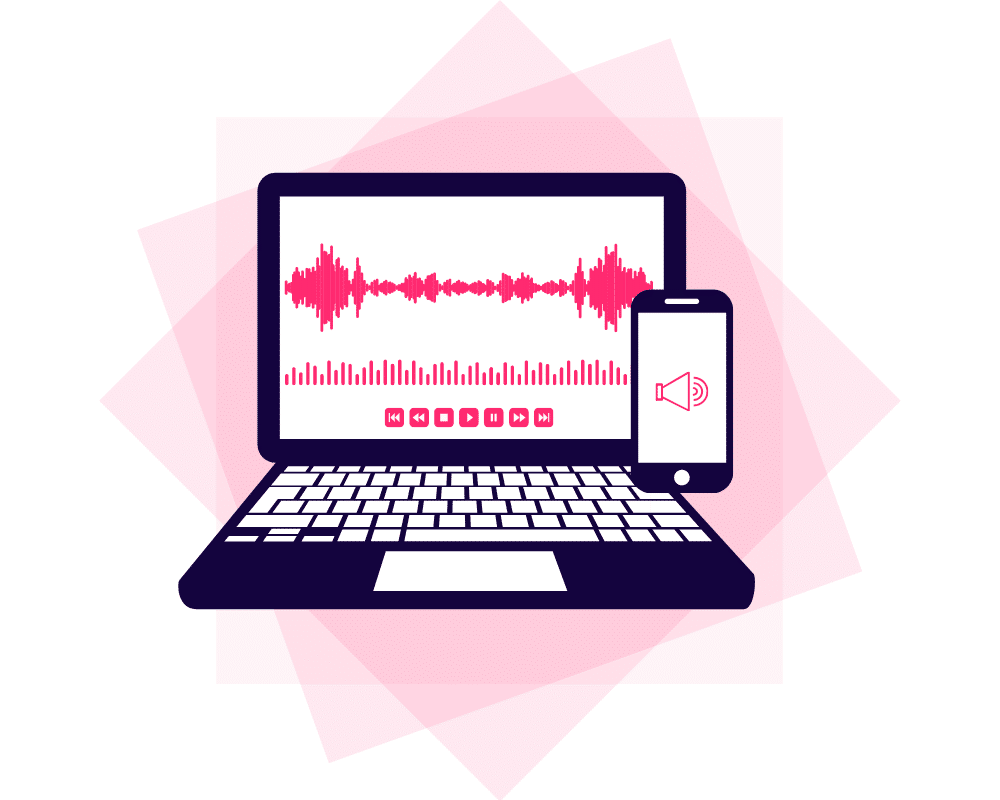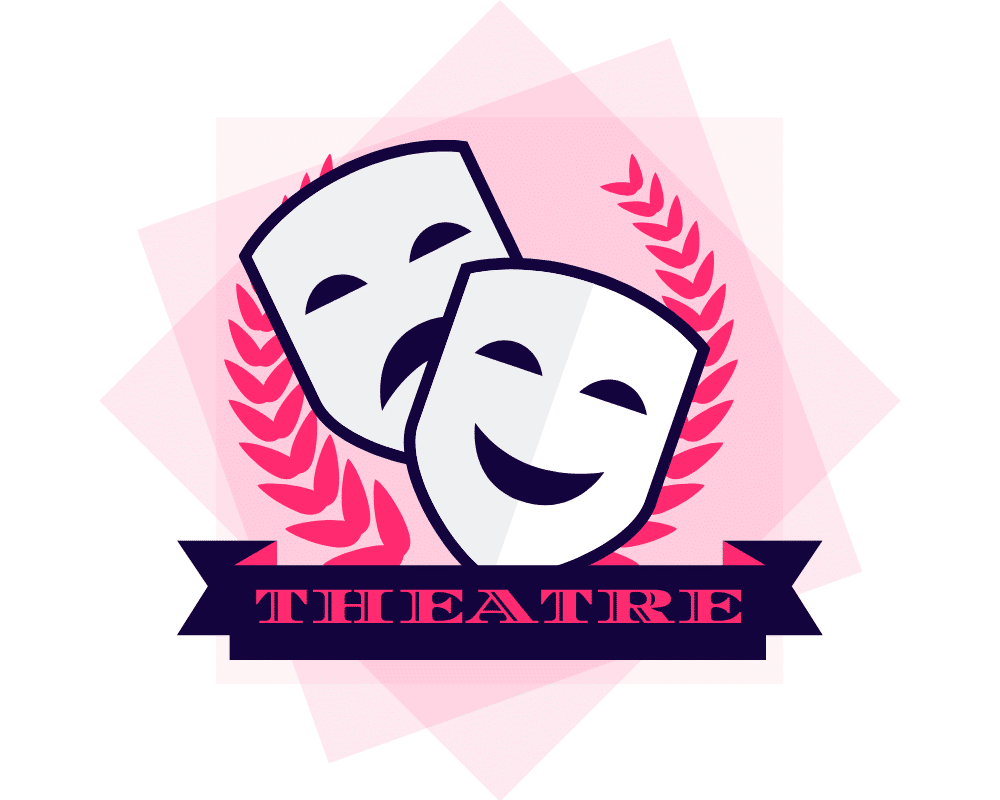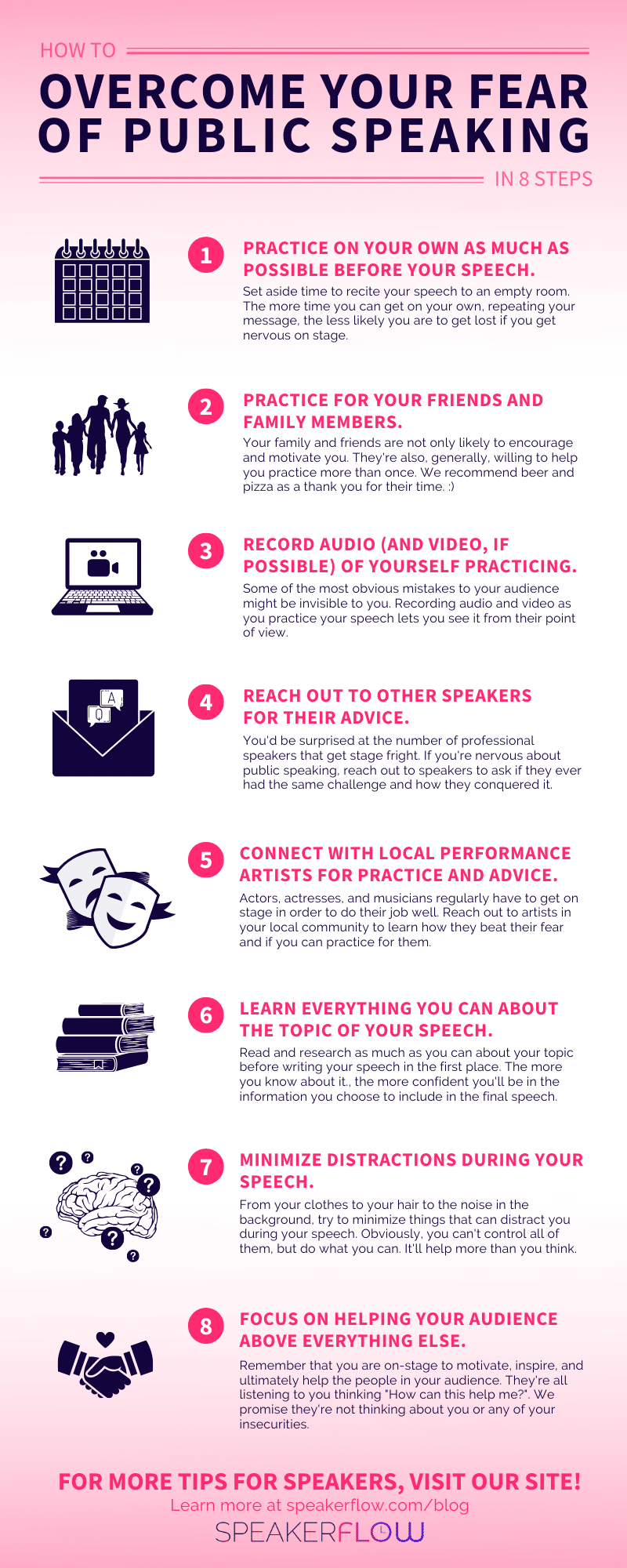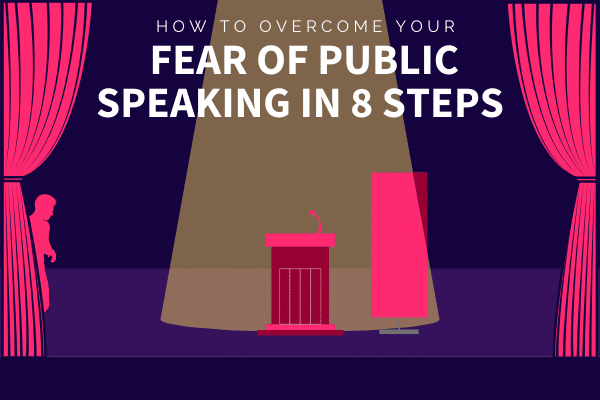Throughout my years of experience in the speaking industry, there have been a few things I learned about it that I can relate to, personally. Having to wear more than one hat, when it comes to roles and responsibilities, is one example. However, the most surprising thing I learned was that many speakers begin their career having to first conquer their stage fright. In fact, for many speakers, their stage persona is completely different than their presence offstage! So, in light of that disparity and the number of speakers that begin their careers this way, let’s talk about that fear. If you’re reading this, thinking about a message you want to share but dreading the stage, this guide for how to overcome your fear of public speaking is a great place to start.
In this checklist, we’ll cover a variety of tips and tricks we, on the SpeakerFlow team, have uncovered with our clients. Based on their experiences, obviously, the most important thing to do is practice. But, what is the best way to practice? Besides repetition, what other techniques help to dispel stage fright? Read on to find out. 👇
- What causes a fear of public speaking?
- How common is a fear of public speaking?
- What can you do to overcome your fear of public speaking?
- 1. Practice on your own as much as possible before your speech.
- 2. Practice for your friends and family members.
- 3. Record audio (and video, if possible) of yourself practicing.
- 4. Reach out to other speakers for their advice.
- 5. Connect with local performance artists, both for practice and advice.
- 6. Learn everything you can about the topic of your speech.
- 7. Minimize distractions during your speech.
- 8. Focus on helping your audience above everything else.
What causes a fear of public speaking?
All in all, a fear of public speaking can be caused by many factors, social, neurological, or experiential. The most prevalent of these factors is the natural stress mechanism, more commonly known as the “fight or flight” response. Although this impulse stems from a primitive need to protect oneself from a physical threat, it also occurs when under emotional or psychological stress. Because of this, when you feel uncomfortable with a group of people, for example, you may want to leave (this is emotional stress due to social pressure). Likewise, the feeling of self-consciousness or anxiety in front of a crowd is, at its core, your fight or flight response kicking in due to that feeling of pressure.
Fear of public speaking can also be heightened depending on your personality, the gravity of the situation in which you’re speaking, negative speaking experiences in your past, or even genetics. In fact, in many of the most extreme cases of stage fright, or “glossophobia,” genetics are thought to play the dominant role in passing this fear on to descendants, as it can be seen in multiple generations of a single family. In these cases, symptoms generally include uncontrollable shaking, perspiration, and an elevated heart rate.
Essentially, the difference between glossophobia and a general fear of public speaking is the extent of these symptoms. However, the root cause of the fear is the same, regardless of its severity: feeling pressured or uncomfortable.
How common is a fear of public speaking?
The good news is that if you are struggling to overcome your fear of public speaking, you’re far from alone. Worldwide, more than 75% of people experience fear of public speaking to some degree. In fact, the fear of public speaking is often feared more than death itself. Crazy to think about, right? Comedian Jerry Sienfeld even did a bit about it in 1998, saying, “According to most studies, people’s number one fear is public speaking. Number two is death. Death is number two. This means to the average person, if you go to a funeral, you’re better off in the casket than doing the eulogy.” That still gets me every time… 😂
Additionally, of that 75%, only about 10% are classified as glossophobic. In other words, while the majority of people are afraid of public speaking, most cases aren’t severe. So, if you read the last section and started worrying that you might be glossophobic, rest assured, you’re probably not.
What can you do to overcome your fear of public speaking?
That said, whether you have glossophobia or not, there’s a wide variety of treatments available, if you’re working to overcome your fear of public speaking. On one hand, considering the psychological nature of fear, one option for treatment is antidepressant or anti-anxiety medication. These are generally regarded as the most extreme treatment option and, as a result, are most commonly prescribed for glossophobic patients. On the other hand, if you’re on the less-severe side of the spectrum of fear of public speaking, most treatments center around practice and exposure. Here, we’ll break down eight of these practice-related options. That way, even if you’re nervous now, you can start where you’re comfortable. Then, you can work your way up to stellar speaking skills from there. 👍
1. Practice on your own as much as possible before your speech.

To start, if you’re totally uncomfortable with speaking in front of others, just start on your own! Take as much time as you need to carefully craft your presentation. Then, start rehearsing on your own in a space in which you feel comfortable and confident. This can be your living room, home office, or a rented workspace. The goal is to eliminate discomfort from your surroundings so you can focus solely on your presentation and gain confidence in the material itself first.
Personally, as a high school student, I used to routinely exercise this tactic before solo presentations. At the time, I was incredibly introverted and easily intimidated by the high-pressure atmosphere of the average classroom. Consequently, even the thought of practicing for others made me feel nauseous, let alone presenting. Thankfully, today, I’m much more confident, speaking in public. However, I still come back to practicing on my own as a starting point, when preparing for a presentation. After all, if I can’t communicate to myself, I sure as you-know-what won’t be able to effectively communicate to a crowd.
Likewise, when starting to overcome your fear of public speaking, start with first focusing on yourself. If you first gain confidence in your speech material and in reciting it alone, it’ll be easier when you have an audience. Plus, the more times you repeat the content of your presentation, the more it will feel like muscle memory. That way, even if you get nervous on stage, the words will come naturally.
2. Practice for your friends and family members.
Once you’ve mastered your material on your own, the next step is mastering it in front of friends and family. Think of the steps to overcome your fear of public speaking like an exercise plan. If you wanted to start a running routine, you wouldn’t immediately start with marathons. As you approached the weight-lifting bench for the first time, you wouldn’t think, “I bet I can bench 300 lbs right off the bat”. In the same way, when conquering your nerves, start with something manageable and gradually push your limits from there.

That’s where friends and family come in (that sounded like an insult, but you know what I mean!). Clearly, your friends and family are great support mechanisms for many reasons. However, when practicing your speaking skills with people who care about you, it’s important to follow a few ground rules. That way, they’re taken care of, for giving up their time to help you, and you know you’re getting good feedback.
From all of us on the SpeakerFlow side of things, these are the rules we hear the most:
- Don’t take it personally if a family member or friend mentions something you’re doing wrong. This sounds common sense, but it’s hard to remember in the heat of the moment that they’re trying to help you, especially if you feel like they’re being nit-picky.
- Do it in real-time. Sending a recording of yourself isn’t a bad move, but it’s not addressing your root fear of presenting in front of others.
- Lastly, make sure your friends and family are thanked for their participation! If you’re practicing virtually, send them a gift card or $5 for a virtual coffee. If you’re practicing in person, treat them to dinner. We recommend beer and pizza. 😁
3. Record audio (and video, if possible) of yourself practicing.
On top of practicing for others, there’s one other way to gain the audience’s perspective, when you speak. I’m talking about recordings. Depending on the tools at your disposal, record audio of your practice sessions or video, if possible. That way, not only can you listen for slip ups in your wording or presentation style. You can also watch for motions or tics that you may not even know you have.

My favorite example of this comes from comedian and journalist Charlie Berens. A Wisconsin native, Berens mentions in a 2019 standup video that, when he originally went into broadcast journalism, he didn’t understand the extent of his midwestern accent. In fact, it wasn’t until he was asked to speak as part of a class assignment that it became abundantly clear how stereotypical his accent was. In his words, his professor concluded the presentation saying, “Charlie, has anybody ever told you that you have a voice for print?” Admittedly, that might sound harsh, but, as a Minnesotan currently writing this with no intention to ever get on stage, I know that accent well. 😅
In the same way, whether you know it or not, there are almost certainly things that you do on stage that distract your audience from your message. On the flip side, there are also likely things that you don’t realize you do well! Maybe you have great posture or a lovely voice. Maybe you have an amazing vocabulary and your education is clear in the structure of your speech. Either way, regardless of your successes and failures, being able to see them from the audience’s point of view is key to resolving the bad things and highlighting the good.
4. Reach out to other speakers for their advice.
Aside from focusing on what you, personally, can do to overcome your fear of public speaking, don’t forget that it’s always okay to ask for help. As mentioned in the beginning, many speakers struggled with a fear of public speaking before their speaking business took off. Additionally, for many speakers currently succeeding on stage, their stage presence is just that: a facade. While they may have grown used to speaking in front of others, they’re naturally an introvert. So, when they’re not required to socialize or present, they’d rather be on their own.

One way that many speakers tackle this juxtaposition of what they need versus what they want is the “fake it until you make it approach”. Essentially, this tactic involves pretending you’re comfortable on stage, even when you aren’t. Not only does this suggest, to your audience, that you’re confident and knowledgeable. It also tricks your brain into believing it, making that fake confidence a reality the more you use it. Harvard Business School psychologist Dr. Amy Cuddy describes this mental shift as the “fake it until you become it” approach, and, in her 2012 TED talk, details the steps necessary to put it into practice. As a side note, it’s a stellar presentation and definitely worth the watch.
Ultimately, though, the “fake it until you make/become it” is just one way to overcome your fear of public speaking. Besides Dr. Cuddy, every speaker that has tackled their own fear has a different tip or trick that worked best for them. In light of that, the next time you have to speak publicly, reach out to other speakers for their advice. Even if you’ve already heard some of it, the speaking industry thrives on connection, so the more speakers you know, the better.
[hubspot type=cta portal=5815852 id=b3ed6230-e78d-4db6-a45e-f16c7b63db16]
5. Connect with local performance artists, both for practice and advice.
In addition to the speaking industry, there are countless other professions that require a solid stage presence. One group that is often overlooked is theatre performers. Regardless of the age group or performance in question, theatre programs help everyone involved overcome their fear of speaking simply so that the show can go on. For many performers, these programs are also the first place they were challenged to tackle their fear in such an aggressive way. Undoubtedly, conquering stage fright while memorizing lines and dance moves can be a bit of a “baptism by fire”. Yet, the results are impressive and long-lasting.

Previously, I learned this first hand as a theatre crew member back in high school. While I wasn’t asked to sing and dance, I was expected to direct and organize the crew as well as the team of volunteers. In short, I went from being responsible for one person (me) to 20 people, minimum. This not only pushed me to project my confidence and authority. It also forced me to speak to large groups of people over and over, whether I was comfortable with it or not.
In the long run, my experience isn’t unique to my life or my school. In fact, for many of the other students I worked or performed with, they were also inadvertently pushed to learn new skills as a part of their theatre experience, including public speaking, leadership, organization, and healthy self-criticism. All of these skills directly translate into the jobs they hold now, even if they don’t speak on a regular basis. Likewise, while theatre might not be your cup of tea, it’s worth reaching out to local performers as well as your speaker colleagues when you need advice. After all, if gawky highschoolers like me can conquer it, you can, too!
6. Learn everything you can about the topic of your speech.
Moving on, the sixth piece of the puzzle, when you overcome your fear of public speaking, is research. It’s no secret that the more you know about a given topic, the more comfortable you are sharing it with others. For me, that tends to be baking tips or drawing techniques. For you, it might be customer retention, employee happiness, or leadership. Whatever topic comes to mind when you think of your skills, remember that you didn’t learn them overnight. In the same way, when you prepare for a presentation, research as much as you need to craft your outline. Then, from there, double that effort. That way, you can be confident when you get on stage that, even under pressure, you know your sh*t.

Overpreparing is especially important if you’re new to speaking altogether. Not only will it make you more confident when your presentation takes place. It also, in making you more confident, increases the likelihood that your speech will go smoothly. Although that’s a win for many reasons, it’s perhaps most important when working to overcome your fear of public speaking, as the memory of a good speech will help reduce your anxiety before future presentations.
This effect is an example of the experiential causes behind stage fright, as humans are wired to be social. Essentially, it’s a positive feedback loop of increasing speaking success and confidence on stage. The more confident you are, the better your speech will be and the more approval you’ll feel from your audience. The better your speech, the more confident you’ll be next time. It takes time, but, ultimately, these gains will help you overcome your fear of public speaking before you know it.
7. Minimize distractions during your speech.
Next, after practicing and preparing your speech, look at your environment in which you’ll be speaking. What is the venue? For speakers with long hair, how are you wearing it? What are you wearing on stage?

At first glance, all of these questions may seem a little superfluous. However, when you’re on stage, all of them play a role in, physically, how comfortable you are. As a result, if you’re freezing cold or your shirt is too tight, for example, you’ll feel self-conscious. As mentioned previously, this self-consciousness is one of the triggers for your “fight or flight response.” So, no matter how airtight your presentation was before you stepped on stage, if your environment stresses you out, you could be unknowingly adding to your anxiety.
Luckily, there are plenty of things you can control, when the day of your presentation comes. Below are some of the recommendations we see most.
- Style your hair so that it’s not in your face (unless, of course, you have bangs).
- Wear flattering, well-fitting clothes. Confidence in your appearance means one less thing to worry about on stage.
- Bring a way to stay comfortably warm, in the event that the venue is freezing. As a Minnesotan, this has happened to me way too many times, leading to lots of numbness and fumbling on stage. Not a good look. 😬
- Visit the venue before your presentation, so you won’t be surprised when you get there.
- Bring a variety of adapters to connect your computer to the venue’s displays.
- Store your presentation in multiple places. That way, if one way doesn’t load, you have a backup.
8. Focus on helping your audience above everything else.
Finally, the last way to overcome your fear of public speaking is to remember why you are there. Above all, you’re working to get on stage, despite your discomfort, because you want to share your message and, in doing so, help others. In the long run, after conquering your fear, you could have a profoundly positive impact on countless audiences and individuals. Even if you don’t change the world in a huge way, your dedication to improvising it is a necessary push for the rest of us in the right direction.

Additionally, from a psychological standpoint, shifting your focus back to others is a key way to shut down your natural fight or flight response. To put it simply, the Harvard Business Review explains the following:
“Studies have shown that an increase in generosity leads to a decrease in amygdala activity. Showing kindness and generosity to others has been shown to activate the vagus nerve, which has the power to calm the fight-or-flight response. When we are kind to others, we feel calmer and less stressed. The same principle applies in public speaking. When we approach speaking with a spirit of generosity, we counteract the sensation of being under attack and start to feel less nervous.”
To Overcome Your Fear of Public Speaking, Stop Thinking About Yourself by Sarah Gershman, Harvard Business Review
So, the next time you feel like you can’t overcome your fear of public speaking, don’t give into it! By following these steps and remembering why you’re passionate about your message in the first place, you can and will get on stage. In the words of Ralph Waldo Emerson, “All the great speakers were bad speakers at first.” With that in mind, even if you’re a “bad speaker” today, start small with these steps. You’d be surprised how quickly, with practice and persistence, you’ll turn into a good one.






